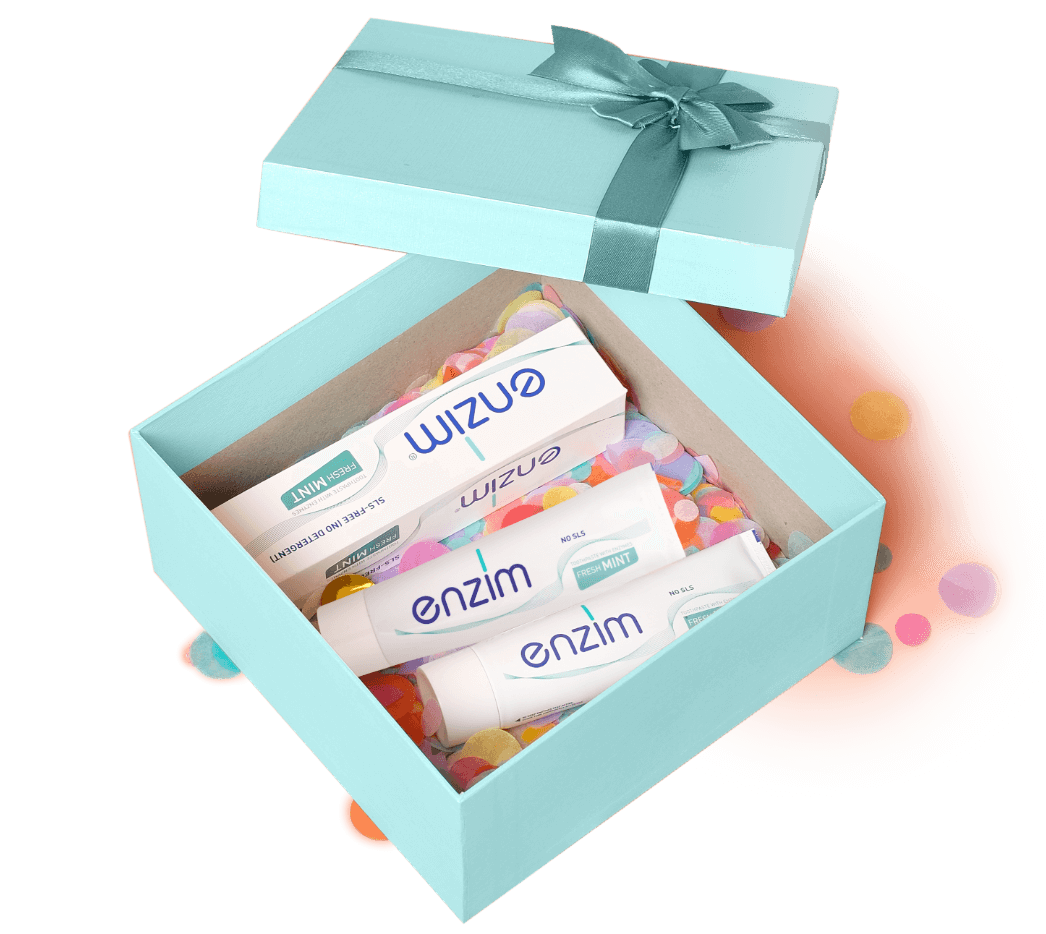How to Prevent Mouth Ulcers from Coming Back: Long-Term Oral Health Tips

How to Prevent Mouth Ulcers from Coming Back: Long-Term Oral Health Tips - Enzim Singapore
Mouth ulcers, small, shallow sores inside the mouth may seem minor, but their recurring nature can turn them into a long-term nuisance. Also known as canker sores, these painful lesions can affect your ability to eat, speak, or even smile comfortably. While a single mouth ulcer might be manageable, repeated outbreaks can significantly impact your quality of life and may even lead to complications if left untreated.
If you're tired of the cycle pain, healing, relief, then flare-up, it's time to focus not just on treatment, but on prevention. This article outlines the most effective long-term strategies to keep mouth ulcers from coming back, including why switching to a gentle, SLS-free product like Enzim Toothpaste should be part of your daily oral health plan.
What Causes Recurring Mouth Ulcers?
Before we dive into prevention, it's important to understand what might be triggering your canker sores in the first place. Common mouth ulcers causes include:
-
Stress and fatigue
-
Minor injuries from brushing too hard, eating sharp foods, or an accidental bite
-
Nutritional deficiencies, particularly in vitamin B12, iron, and folate
-
Hormonal changes
-
Immune system imbalances
-
Food sensitivities, especially to acidic foods, spicy items, or hot drinks
-
Irritation from toothpaste or mouthwash, particularly those containing Sodium Lauryl Sulfate (SLS)
-
Gastrointestinal diseases such as Crohn's disease or celiac disease
-
Medications including beta blockers, bisphosphonates, and nicorandil
-
Family history of recurrent canker sores
If you get mouth ulcers frequently, your body may be reacting to multiple triggers at once. That's why prevention often involves addressing your lifestyle, diet, and oral care habits together.
Types of Canker Sores
Before we delve into prevention strategies, it's important to understand the different types of canker sores:
-
Minor canker sores: The most common type, these small, oval-shaped ulcers heal within a week or two without scarring.
-
Major canker sores: Larger and deeper than minor canker sores, these can be extremely painful and may take several weeks to heal, often leaving a scar.
-
Herpetiform canker sores: These are clusters of dozens of smaller ulcers that may merge into one large ulcer. Despite the name, they are not caused by the herpes simplex virus.
It's important to note that canker sores are different from fever blisters or cold sores, which are caused by the herpes simplex virus and appear on the outside of the mouth.
1. Choose the Right Toothpaste — Every Day
Many people don't realize that their toothpaste might be contributing to their recurring mouth sores. Most commercial toothpastes contain Sodium Lauryl Sulfate (SLS), a foaming agent that can dry out and irritate the soft tissues in your mouth — making them more prone to injury and slower to heal.
Why Enzim Toothpaste Makes a Difference:
-
SLS-Free Formula: Eliminates one of the most common hidden causes of mouth ulcers.
-
Enzyme-Based Protection: Helps maintain the natural balance of good bacteria in the mouth.
-
Gentle and Alcohol-Free: Does not sting or irritate even during an active flare-up.
-
Supports Oral Healing: Especially helpful for those with sensitive mouths or chronic sores.
Using Enzim Toothpaste consistently is a proactive step toward reducing your risk of mouth ulcers, especially if they've been a regular part of your life.
2. Improve Your Brushing Habits
Oral hygiene is essential, but too much force or the wrong tools can backfire and potentially cause a mouth injury, leading to canker sores on the mouth lining.
Prevention Tips:
-
Use a soft-bristled toothbrush
-
Brush gently in circular motions, especially near the gumline
-
Replace your toothbrush every 2-3 months
-
Avoid mouthwashes that contain alcohol or strong antiseptics, which can dry out tissues
-
Consider using an antimicrobial mouthwash containing chlorhexidine gluconate to reduce bacteria
Pairing these habits with a gentle toothpaste like Enzim will ensure your routine is protective, not harmful.
3. Manage Stress
Stress doesn't just affect your mood — it can weaken your immune system and trigger mouth ulcers. Many people report flare-ups during exams, deadlines, emotional periods, or after a lack of sleep.
Stress-Reducing Habits:
-
Daily exercise, even a 15-minute walk
-
Deep breathing or meditation
-
Prioritizing adequate sleep
-
Setting healthy work/life boundaries
-
Talking to a friend or therapist when overwhelmed
If emotional stress is a recurring theme in your ulcer outbreaks, managing it should be a top priority in your prevention plan.
4. Address Nutritional Deficiencies
Deficiencies in certain nutrients can weaken your immune response and slow tissue healing, potentially leading to more frequent canker sores.
Essential Nutrients for Oral Health:
-
Vitamin B12
-
Iron
-
Folate
-
Zinc
If you get mouth ulcers often, consider asking your doctor for blood tests to check your levels. Even a mild deficiency can increase your risk of developing mouth sores.
You can also improve your intake by eating:
-
Leafy greens (spinach, kale)
-
Legumes (lentils, chickpeas)
-
Whole grains and fortified cereals
-
Lean meats and eggs
-
Nuts and seeds
Supplements may be helpful, but consult a healthcare provider before starting any new regimen, especially if you're on immunosuppressant medication.
5. Watch Your Diet
Some people experience mouth ulcers after consuming specific foods. Common triggers include:
-
Citrus fruits (oranges, lemons, pineapples)
-
Tomatoes
-
Spicy or peppery foods
-
Salty snacks
-
Chocolate
-
Coffee or highly acidic drinks
-
Hot drinks
Prevention Strategy: aphthous
-
Keep a food diary to track what you eat and when ulcers appear
-
Identify and avoid your personal triggers
-
Rinse your mouth with water after eating acidic foods
-
Maintain a balanced, nutritious diet rich in anti-inflammatory ingredients (like omega-3s and leafy greens)
-
Be aware of any food intolerances that may contribute to mouth ulcers
6. Stay Hydrated
Dehydration can dry out the mucous membrane in your mouth, making it more vulnerable to irritation and breakdown.
How to Stay Hydrated: herpetiform canker sore
-
Drink 8–10 glasses of water a day
-
Avoid excessive caffeine or alcohol, which can dry you out
-
Keep a water bottle with you throughout the day, especially in hot weather
Proper hydration supports healing and helps maintain the integrity of your mouth's soft tissue.
7. Protect Against Physical Trauma
Injuries from dental appliances, accidental bites, or sharp foods are common triggers for mouth ulcers — especially if your mouth tissue is already inflamed or sensitive.
Tips to Avoid Mouth Trauma: minor canker sore
-
Use orthodontic wax on braces or sharp tooth edges
-
Avoid biting hard or crusty foods
-
Chew slowly and mindfully
-
Get regular dental checkups to ensure your dental devices fit well
Even minor adjustments to your daily routine can reduce the likelihood of mouth injuries and subsequent ulcers.
8. Build a Consistent Oral Health Routine
Consistency is key to prevention. Make it easy to stick to a simple, daily care system that supports your mouth's natural defenses and promotes good oral hygiene.
Sample Daily Routine:
Morning
-
Brush with Enzim Toothpaste
-
Rinse with water or a gentle salt mouthwash
-
Eat a balanced, non-acidic breakfast
Afternoon
-
Stay hydrated
-
Avoid acidic foods or spicy snacks
-
Chew mindfully
Evening
-
Brush again with Enzim Toothpaste
-
Gently floss
-
Use a soothing rinse if your mouth feels irritated
-
Sleep 7–9 hours
Home Remedies and Medical Treatments
While prevention is key, sometimes you may need additional help to manage canker sores. Here are some home remedies and medical treatments that can provide relief:
Home Remedies:
-
Rinse with warm salt water
-
Apply honey to the sore
-
Use milk of magnesia as a mouth rinse
-
Dab a small amount of baking soda paste on the ulcer
Medical Treatments:
-
Over-the-counter topical treatments containing benzocaine for pain relief
-
Antiseptic gel to reduce inflammation and promote healing
-
Antimicrobial mouthwash to prevent infection
-
For severe cases, your doctor may prescribe a steroid mouthwash or other medications
Remember, if you have a canker sore that persists for more than three weeks, it's important to see a healthcare professional to rule out more serious conditions like mouth cancer.
Why Enzim Toothpaste Is Key to Long-Term Prevention
Of all the small changes you can make, choosing a gentle, SLS-free toothpaste like Enzim is one of the simplest and most effective. It eliminates a common irritant, helps balance the oral environment, and supports the healing process without discomfort.
Whether you're currently experiencing aphthous ulcers or just want to stop them from coming back, Enzim is a safe, effective choice for everyday use.
Final Thoughts
Recurring mouth ulcers don't have to be a fact of life. With the right prevention strategies — including good nutrition, stress management, and gentle oral care — you can significantly reduce their frequency and severity.
Start with small changes. Swap your toothpaste, slow down your brushing, hydrate more, and pay attention to what your body is telling you. Be aware of potential triggers like tobacco use or certain medications. If you experience a tingling sensation in your mouth, it might be the early sign of a canker sore developing.
And if you're serious about prevention, Enzim Toothpaste is your daily companion in building a mouth that heals faster, stays healthier, and hurts less.
Goodbye, canker sores. Hello, lasting oral comfort.
